Sec. of State Antony Blinken urges Congress to act on delayed ambassadorial nominations
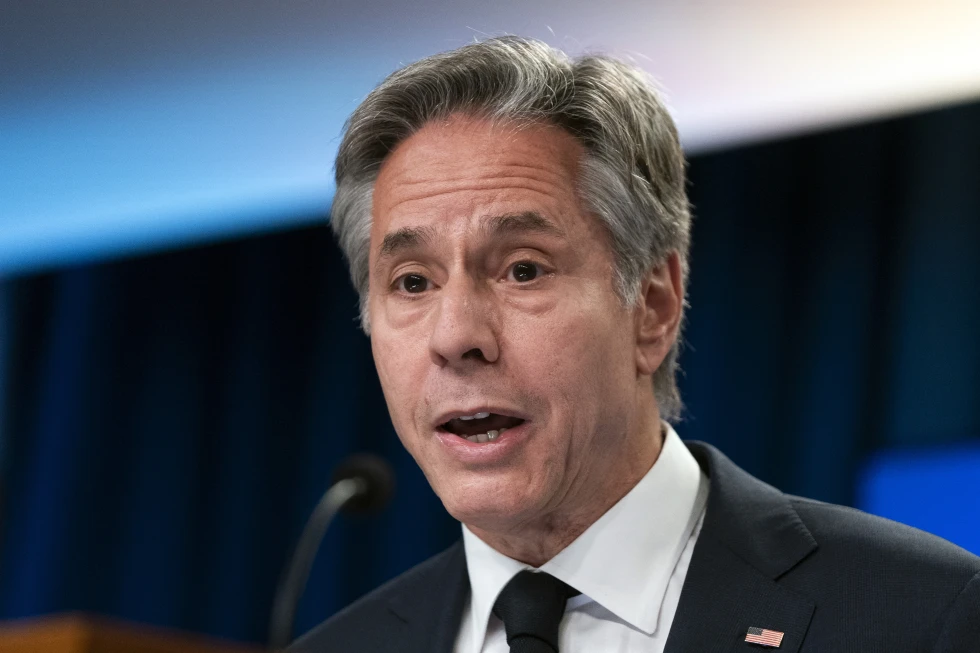
Secretary of State Antony Blinken on Monday urged the Senate to move forward with votes on more than 60 diplomatic nominations, including 38 ambassadors, that have been stalled due to objections by individual lawmakers. In a letter to all 100 senators and in public comments, Blinken said delays in confirmation votes for these nominees constitute a national security risk. Blinken said 35 of the 38 ambassadorial nominees are career foreign service officers who have served in both Republican and Democratic administrations. “Vacant posts have a long-term negative impact on U.S. national security, including our ability to reassure allies and partners, and counter diplomatic efforts by our adversaries,” Blinken wrote in the letter. In particular, he pointed to China and Russia as the main beneficiaries of Senate inaction. Blinken singled out Republican Sen. Rand Paul of Kentucky as the main impediment. Paul has put a blanket hold on all State Department nominees, citing the Biden administration’s refusal to provide him documents related to the origin of the COVID-19 pandemic. “No one is questioning the qualifications of these career diplomats,” Blinken told reporters. “They’re being blocked from leverage on other unrelated issues. It’s irresponsible, and it’s doing harm to our national security.” State Department spokesman Matthew Miller said later that Paul was holding qualified career nominees “hostage” for no good reason. “Senator Paul can make legitimate requests at the State Department or others in the administration; what we object to is him holding hostage nominees,” he said. The backlog of State Department nominees awaiting Senate confirmation is similar but less pronounced than that facing the Pentagon. One Republican Senator, Tommy Tuberville of Alabama, has a blanket hold on all Defense Department nominations and promotions in an attempt to try to change Pentagon’s abortion policy. Tuberville has already stalled more than 260 nominations of senior military officers, and that number could balloon to 650 by the end of the year. Republished with the permission of The Associated Press.
Katie Britt, Rick Scott and colleagues urge Biden Administration to address passport delays

On Monday, U.S. Senator Katie Britt (R-Alabama) announced that she has joined Senator Rick Scott (R-Florida) and 12 of their colleagues in a letter to Secretary of State Antony Blinken urging him to take immediate action to resolve the backlog of passport applications. “Given the sheer number of Alabamians who have recently requested help with a passport issue, I’m concerned that action has not been taken sooner to address this concern, which clearly affects a great number of Alabamians,” said Sen. Britt. “As record levels of Americans continue to book flights across the globe, we request this matter be dealt with immediately and transparently to prevent further backlog.” More Americans are seeking passports, and there are growing delays in obtaining or renewing a passport. According to a recent report, it can take 17 weeks to get a passport renewed. This turnaround time has grown several weeks just since February. In the letter, the Senators note countless reports from Americans in their respective states regarding issues and concerns with delayed wait times, lack of available in-person appointments, and an inability to communicate with passport agencies. The Senators charge that this is an unacceptable failure from a federal government that should be focused on serving American taxpayers and their needs. Joining Senators Britt and Scott were U.S. Senators Bill Cassidy (R-Louisiana), Ted Cruz (R-Texas), Mike Crapo (R-Idaho), John Barrasso (R-Wyoming), Cynthia Lummis (R-Wyoming), Ted Budd (R-North Carolina), Marco Rubio (R-Florida), JD Vance (R-Ohio), Mitt Romney (R-Utah), Joni Ernst (R-Iowa), and Deb Fischer (R-Nebraska). “As summer begins and families across the nation are finalizing their travel plans, we have heard countless reports from constituents in our states about the massive backlogs in processing passport applications,” the Senators wrote to Sec. Blinken. “While we appreciate the hard work of Passport Agency employees across the nation, this backlog and the unresponsiveness to many passport inquiries is unacceptable.” “Since January 2023, our offices have observed a massive increase in passport-related inquiries from our constituents,” the Senators continued. “We understand that the Department of State is experiencing an unprecedented number of passport applications and renewals, but the strategies put in place to address this unprecedented demand appear to need additional attention.” “These backlogs have resulted in many American families being forced to cancel their travel plans because of increased wait times, a lack of available in-person appointments, and an inability to communicate with passport agencies,” wrote the Sens. “Furthermore, the delay many Americans are experiencing in receiving their passport could potentially be detrimental to their livelihood. The Department of State must address these issues promptly to remedy the situation. As our offices continue to work each and every day to assist constituents with their passport needs.” Many countries require a passport to be valid six months after your trip ends. These include India, Kenya, Morocco, Peru, Singapore, Thailand, Turks and Caicos, and Zimbabwe. All 27 European Union member countries require passports to be valid for at least three months beyond the date of departure. Some countries are more visitor-friendly and only require your passport to be valid. These include Argentina, Australia, Dominican Republic, Japan, and the United Kingdom. For travel to Hong Kong, the requirement is one month beyond the trip. Since renewing a passport can take four months, plan accordingly if you have plans to travel or work in a field where foreign travel may be required at some point. Katie Britt was elected to the Senate in 2022 after a career as a lobbyist, attorney, and Sen. Richard Shelby’s chief of staff. To connect with the author of this story or to comment, email brandonmreporter@gmail.com.
Katie Britt backs bipartisan legislation to solidify American sanctions on Iran

U.S. Senator Katie Britt recently joined Presidential candidate U.S. Senator Tim Scott (R-South Carolina) and Senators Maggie Hassan (D-New Hampshire), Bill Hagerty (R-Tennessee), and Jacky Rosen (D-Nevada) in cosponsoring the Solidify Iran Sanctions Act (SISA) to make permanent the Iran Sanctions Act of 1996. “This legislation sends an important bipartisan message to Iran that the United States will not tolerate continued threats to American national security,” said Sen. Britt. “Peace is achieved through strength. We must stand firm against bad actors and ensure that, first and foremost, our homeland is protected against aggression. I will always fight for America’s safety, and this act is a strong step to safeguard our nation’s future.” “As evidenced by the recent Iranian-backed drone strike in Syria that tragically killed South Carolinian Scott Dubis and the recent seizure of a U.S.-bound oil tanker, it is clear that Iran continues to engage in destabilizing activities that threaten the safety of America, Israel, and our other partners in the region,” Sen. Scott said. “Cementing these sanctions will apply pressure on Iran and help restrain this regime from developing weapons that threaten safety and security around the world.” “We must do everything that we can to prevent Iran from building a nuclear weapon and stop its support of terrorism,” said Sen. Hassan. Cementing these sanctions would advance national security by restraining Iran from engaging in malign activities that threaten the United States and its allies. SISA would also ensure that America’s sanctions regime continues to apply pressure on Iran amid its continuing dangerous nuclear escalation. In 1996, Congress passed the Iran Sanctions Act (ISA), which allowed the president to impose secondary sanctions on Iran’s energy sector. Throughout the years, ISA provisions were expanded to include other Iranian industries. ISA consists of “triggers” that place sanctions on firms or entities that violate U.S. sanctions under this law. As Iran continues its nuclear enrichment towards a weapons-grade level, it is essential that the United States solidifies its pivotal sanctions to apply pressure toward the rogue regime. The Solidify Iran Sanctions Act removes the sunset provision in the ISA and signals that the U.S. remains firmly committed to sanctioning the regime until it changes its malign behavior. A companion bill was introduced in the House of Representatives by Rep. Michelle Steel (R-California), Rep. Michael McCaul (R-Texas), the Chairman of the House Committee on Foreign Affairs, and Rep. Susie Lee (D-Nevada). There were international sanctions on Iran, but those went away in the Iran nuclear deal negotiated during the Obama administration. President Donald Trump reimposed U.S. sanctions, but the rest of the international community did not follow America’s lead. President Joe Biden has made some overtures towards negotiating a new deal with Iran, but Iran has not been receptive. U.S. Secretary of State Antony Blinken said on Wednesday that there was no nuclear deal with Iran on the table. “There is no agreement in the offing, even as we continue to be willing to explore diplomatic paths,” Blinken said at the Council on Foreign Relations in New York. “We’ll see by their actions.” Blinken called on Iran to “not take actions that further escalate the tensions” with the United States and the Middle East. Katie Britt was elected to the U.S. Senate in 2022 To connect with the author of this story or to comment, email brandonmreporter@gmail.com.
Mike Rogers disappointed in ‘accountability and transparency’ regarding Afghanistan withdrawal
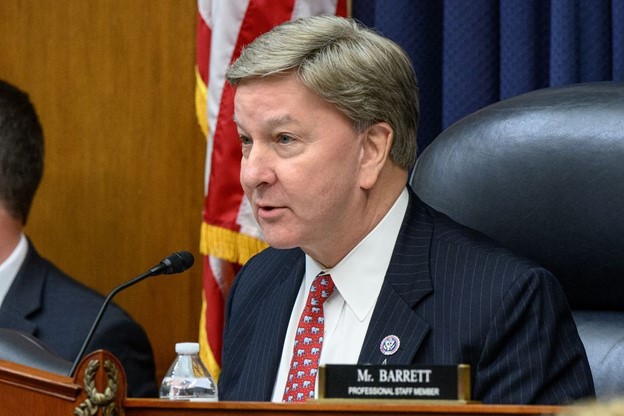
Last week Congressman Mike Rogers (R-AL03), the Chairman of the House Armed Services Committee, sent a letter to Secretary of Defense Lloyd Austin expressing his disappointment in the lack of accountability and transparency from the Department of Defense in the classified After Action Review (AAR) concerning the Biden administration’s withdrawal from Afghanistan. In the letter, Chairman Rogers wrote, “I have written to you separately in a classified letter (transmitted June 8, 2023) pointing out multiple discrepancies in the classified version of the After Action Review (“AAR”) concerning the botched and deadly withdrawal of U.S. Forces from Afghanistan. My classified letter also addresses your associated personal reflections (attached as a classified memorandum to the AAR). Sadly, your memorandum does not accept responsibility, and propounds outright untruths, related to the Biden Administration’s actions and inactions in failing to secure a safe and orderly withdrawal of troops and related Non-Combatant Evacuation Operation (“NEO”).” “While the fog of war is likely to result in mistakes and even tragedy, an honest appraisal of the Biden Administration’s involvement in implementing the disastrous withdrawal from Afghanistan has still not occurred,” Rogers wrote. “Towards this objective, it is incumbent on the Committee and its oversight responsibilities to determine what went wrong and how such a catastrophe can be avoided in the future.” “To this end, I will await your response to my questions in the classified letter,” Rep. Rogers continued. “Moreover, the Department’s AAR produced to the House omitted significant portions included in its Table of Contents, including all endnotes and other appendices to the report. Additionally, significant redaction of material in the classified report is not explained. The Committee relies upon transparency in conducting oversight for the American people, so I hope exclusion of associated documents with the AAR was unintentional and that the Committee can receive an appropriately un-redacted version. Please produce all documents, no later than July 7, 2023, associated with the AAR as listed in the report’s Table of Contents.” According to a report released by the U.S. Senate Committee on Foreign Relations in February 2022, as many as 9,000 Americans were left behind in Afghanistan after the U.S. military’s rushed evacuation on August 31, 20211. The exact number of Americans remaining in Afghanistan is not known for sure. U.S. Secretary of State Antony Blinken estimated that less than 200 Americans are remaining in Afghanistan, and it’s “likely closer to 100”. Another report from August 2021 stated that as many as 15,000 Americans remained in Afghanistan after the Taliban takeover of the country. The State Department believes as many as 14,000 U.S. legal permanent residents remain in Afghanistan. Additionally, an estimated 78,000 SIV-holding American allies are stranded in Afghanistan. Many Afghan interpreters that worked with U.S. forces in Afghanistan were left behind. The U.S. did manage to get out 6,000 American citizens and thousands more of our Afghan allies, but the evacuation ended after a bomber killed 13 American servicemembers. Rogers is in his 11th term representing Alabama’s Third Congressional District. Rogers previously served in the Alabama House of Representatives and on the Calhoun County Commission. To connect with the author of this story or to comment, email brandonmreporter@gmail.com.
Tommy Tuberville: “We have got to get out of this war in Ukraine”
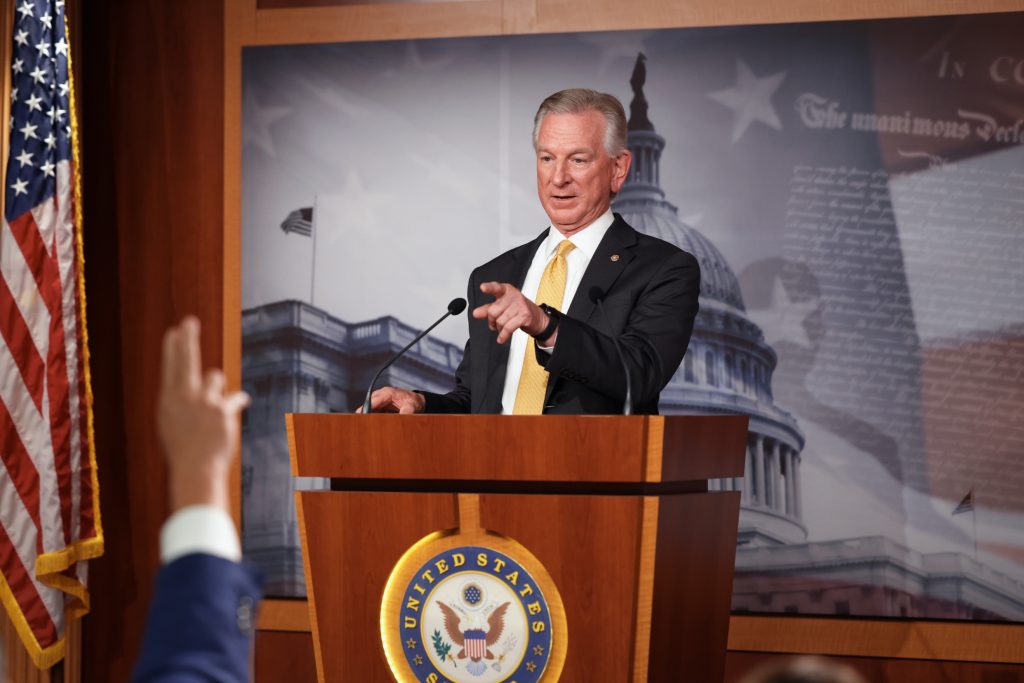
On Wednesday, U.S. Senator Tommy Tuberville told Alabama Today, “We have got to get out of this war in Ukraine. Ukraine can’t beat Russia.” During Tuberville’s weekly phone call with media members, Alabama Today asked Sen. Tuberville if now would be a good time for the United States and its allies to press Ukraine and Russia to negotiate an end to the fighting. “The war in Ukraine is a disaster for the United States,” Tuberville responded. “We jumped in all four feet, knowing that we didn’t have enough munitions to help Ukraine. We don’t want to put boots on the ground. I am all for Ukraine, but you have got to have an opportunity to win, and we don’t have one person that has any insight in terms of diplomacy from this White House or this administration. Secretary [Antony] Blinken has done zero. You know, the Chinese laugh at the guy. President [Joe] Biden needs to be on the phone every day to stop this. We have gotten hundreds of thousands of people killed. There is all kinds of rumors about money that has been stolen from the American taxpayer that is going over there. We don’t know.” Tuberville says that the Biden Administration is sharing very little intelligence on the situation with the Senate Armed Forces Committee, on which he serves. “I am on the Armed Services Committee,” Tuberville said. “We get very little intel and obviously very embarrassed about this administration when they tell us about all these documents that have been released. They were caught. They were caught red-handed with lying to the American people, lying to the media, and you can’t trust them. You can’t trust our government up here, so every day, there is something different.” Tuberville said it is important to end this war as soon as possible. “It is unfortunate that it is like that, but somehow, we have got to get out of this war in Ukraine,” Tuberville continued. “We have got to get Ukraine out in terms of getting more people killed. Russia is not going to let up. It is going to continue to go on. They are waiting for the ground to dry out, and they will have an offensive of their own.” Tuberville blamed hawks in Washington for this situation. “It is unfortunate this has happened,” stated Tuberville. “We have got way too many hawks up here that wanted to jump in there thinking that Ukraine can beat Russia. Ukraine can’t beat Russia. We would be lucky to beat Russia right now, given the few munitions that we have. Given how much that has been given away. There is not a lot of thought that has gone into this other than just them sticking their chest out, saying we are going to do it this way. It’s gotten us in pretty deep in terms of problems that we are having right now as the United States.” Tuberville did not mince words in his criticism of the Biden Administration and its foreign policy. “They have lied to us about Ukraine,” Tuberville told reporters. “They have lied to us about a lot of different things. This administration has just absolutely been a joke when it comes to foreign policy.” Tuberville was elected to the U.S. Senate in 2020 following a forty-year career as an educator, coach, and sports broadcaster. To connect with the author of this story or to comment, email brandonmreporter@gmail.com.
Bipartisan congressional caucus forms to address fentanyl crisis
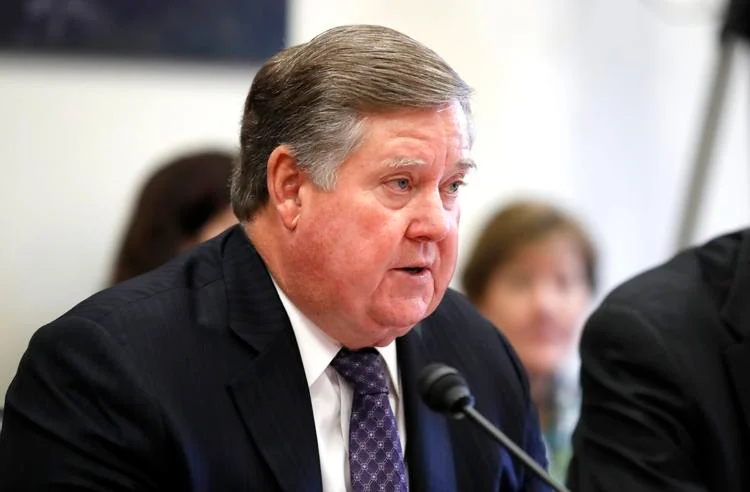
Labeling the smuggling of illicit fentanyl into the U.S. from Mexico “a national crisis,” a group of lawmakers has formed a bipartisan caucus to address the issue. Led by Republican California Reps. Ken Calvert and Darrell Issa and Democratic Reps. Joe Neguse of Colorado and Madeleine Dean of Pennsylvania, the Bipartisan Fentanyl Prevention Caucus was formed to “coordinate with members from both sides of the aisle to combat the nationwide spike in fentanyl-related overdoses and drug poisonings.” The group says it will work with federal and state law enforcement and “to educate the public and the Congress, in cooperation with prevention and awareness groups to better understand the ongoing threat of fentanyl in communities across America.” “Fentanyl is devastating the lives of Americans in every corner of our country. With fentanyl-related deaths climbing every year, we need new solutions to stop this alarming trend,” Calvert said. “This is not a partisan issue – it’s a national crisis.” Rather than pledging to end the fentanyl crisis, Calvert said he hoped the caucus would “educate Americans on the dangers of fentanyl and provide real solutions that will stop the destruction of this deadly drug.” “Fentanyl is not a new danger. But the deadly threat it poses has now reached every corner of our country, and no community is being spared,” Issa said. “The stakes could not be more clear: If we don’t win the fentanyl fight, we’re not going to just lose my community or my neighbor’s. Or any one of my colleagues. We’re going to lose this country. This caucus is needed now as we tell the truth, develop solutions, and save lives.” When announcing its formation, the caucus didn’t call on the president or Secretary of State Antony Blinken to declare Mexican cartels as Foreign Terrorist Organizations, as Texas Gov. Greg Abbott and 21 attorneys general have repeatedly done. Last September, Abbott issued an executive order designating the Sinaloa Cartel, the Jalisco New Generation Cartel, and any similarly situated Mexican drug cartels as foreign terrorist organizations” under Section 219 of the Immigration and Nationality Act. He also requested President Joe Biden do likewise, the second time he’d made the request since April 2021. In his September 21, 2022 letter, Abbott said since then, “There was no action, no response.” He’s still received no response, his office has told The Center Square. Last week, Blinken told Congress he’d consider designating cartels as FTOs. Two weeks prior, the White House said it didn’t have any intention of doing so. Republican U.S. Sens. Rick Scott of Florida and Roger Marshall of Kansas introduced the Drug Cartel Terrorist Designation Act, which Florida Attorney General Ashley Moody said will “do the job Biden refuses to do – protect the American people.” The caucus also hasn’t demanded the president designate fentanyl as a weapon of mass destruction, as 18 attorneys general have done led by Moody. Fentanyl poisoning remains the leading cause of death among adults between the ages of 18 and 45. Two milligrams, the weight of a mosquito, is lethal. In fiscal years 2021 and 2022, CBP agents confiscated enough fentanyl to kill nearly 5 billion people. Since March 2021, Texas Operation Lone Star officers have seized over 373 million lethal doses of fentanyl. Florida law enforcement officers in a few month’s time last year seized enough fentanyl to kill everyone in Florida. The U.S. Drug Enforcement Administration has issued several public alerts warning Americans about the dangers of fentanyl. Most recently it issued another public alert about the “sharp increase in the trafficking of fentanyl mixed with Xylazine,” an animal tranquilizer referred to on the streets as “Tranq.” It did so after the FDA, CDC, and multiple state agencies issued warnings about Xyzaline being detected in an increasing number of illicit drug mixtures and a growing number of overdose deaths nationwide. “Xylazine is making the deadliest drug threat our country has ever faced, fentanyl, even deadlier,” DEA Administrator Anne Milgram said. DEA has so far seized Xylazine and fentanyl mixtures in 48 of 50 states. Caucus members also include Angie Craig (D-MN), Chris Pappas (D-NH), Raja Krishnamoorthi (D-IL), Melanie Stansbury (D-NM), Chrissy Houlahan (D-PA), Ruben Gallego (D-TX), Nikki Budzinski (D-IL), Marc Veasey (D-TX), Sheila Jackson Lee (D-TX), Raúl Grijalva (D-AZ), Doug Lamborn (R-CO), Sharice Davids (D-KS), Don Bacon (R-NE), Claudia Tenney (R-NY), Andre Carson (D-IN), Ralph Norman (R-SC), Chris Smith (R-NJ), Lance Gooden (R-TX), Bob Latta (R-OH), Andy Biggs (R-AZ), Jake LaTurner (R-KS), Barry Moore (R-AL), David Valadao (R-CA), and Robert Aderholt (R-AL). Republished with the permission of The Center Square.
Rep. Mike Rogers and colleagues warn that Russians are helping China obtain plutonium
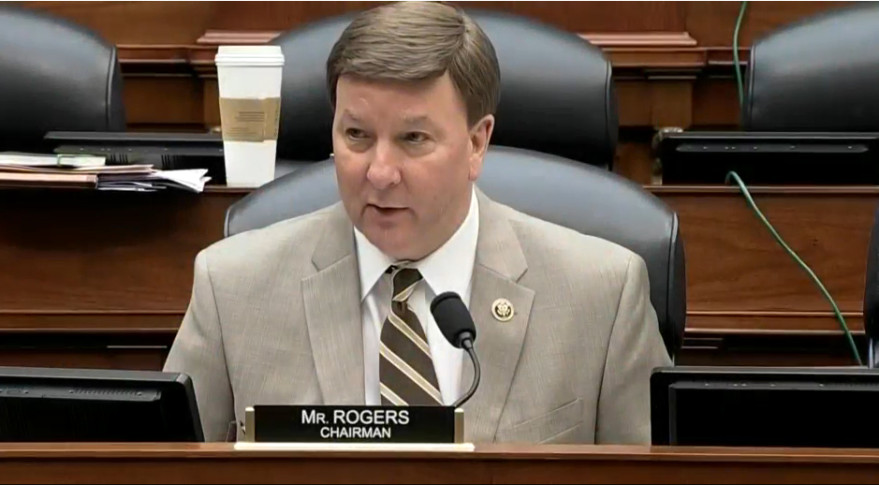
On Thursday, House Armed Services Committee Chairman Mike Rogers, House Foreign Affairs Committee Chairman Michael McCaul, and House Permanent Select Committee on Intelligence Chairman Mike Turner urged National Security Advisor Jake Sullivan, Secretary of State Antony Blinken, Secretary of Defense Lloyd Austin, Secretary of the Treasury Janet Yellen, Secretary of Energy Jennifer Granholm, Secretary of Commerce Gina Raimondo, and Director of National Intelligence Avril Haines, to utilize the full application of sanctions, export controls, and diplomacy, to hinder the nuclear cooperation between Russia’s Rosatom and China. In the letter, Rogers and the other Chairmen wrote, “Russia’s state-owned nuclear energy corporation, Rosatom, is helping the People’s Republic of China (PRC) acquire enough weapons-grade plutonium to fuel its strategic nuclear breakout. Beyond fueling the PRC’s strategic nuclear breakout, then-U.S. Strategic Command commander Admiral Charles Richard called “breathtaking,” Rosatom helps fuel Putin’s war efforts in Ukraine. We call on the Administration to view this cooperation for what it is, a direct threat to U.S. security and more evidence that Russia and China are working in tandem against the United States. The Administration should use all tools at its disposal to stop Rosatom and the PRC’s dangerous cooperation.” “Despite these malign activities, Rosatom’s position in the global market is only getting stronger,” Rogers et al. wrote. “The longer we wait to act, the more difficult it will be to address Rosatom’s nefarious and malign dealings. Putin uses these funds to fund his war machine and keep his favorite weapons programs on schedule. In short, every dollar and euro that Rosatom brings in directly finances the death and destruction we see in Ukraine, China’s nuclear weapon expansion, and is a direct threat to the American way of life.” The chairmen say in the letter is based on “Our classified correspondence from earlier this year.” “Russia’s role in China’s nuclear energy program is well documented,” the Chairmen wrote. “Rosatom opened an office in Beijing in 2016 and partnered extensively with the PRC’s China National Nuclear Corporation (CNNC) on major projects worth billions. On May 19, 2021, Xi Jinping and Vladimir Putin tuned in via video link to witness the commencement ceremony of two of the countries’ major nuclear energy cooperation projects, the Tianwan Nuclear Power Plant and Xudabao Nuclear Power Plant.” “Rosatom now appears to be supplying equipment and highly enriched uranium (HEU) for the PRC’ CFR-600 sodium-cooled fast breeder nuclear reactors, which will produce plutonium, fissile material critical to the PRC’s nuclear breakout,” the Chairmen wrote. “Russian deliveries of HEU to the PRC are slated to begin this year. The Department of Defense’s 2022 report to Congress on the Military and Security Developments Involving the People’s Republic of China noted the key role that increased weapons-grade plutonium production is key to the PRC nuclear program, stating: “The PRC is also supporting this expansion by increasing its capacity to produce and separate plutonium by constructing fast breeder reactors and reprocessing facilities.” The DoD report also cites the CFR-600 reactors and notes that each will be capable of producing “enough plutonium for dozens of nuclear warheads annually.” This buildup puts the PRC in violation of Article VI of the NPT, requiring states to make good-faith efforts to cease an arms race and to engage in good-faith arms control negotiations. Make no mistake, the PRC and Russia’s actions constitute an acceleration of their ongoing arms race.” According to the U.S. Intelligence National Threat Assessment, “China is building hundreds of new ICBM silos.” “Moscow continues to develop long-range nuclear-capable missile and underwater delivery systems meant to penetrate or bypass U.S. missile defenses,” said the report. “Russia is expanding and modernizing its large, diverse, and modern set of nonstrategic systems, which are capable of delivering nuclear or conventional warheads because Moscow believes such systems offer options to deter adversaries, control the escalation of potential hostilities, and counter U.S. and allied conventional forces.” In response to China and Russia’s modernization of their strategic forces, including the development of hypersonics, the U.S. is rushing to deploy hypersonics. The U.S. Air Force is expected to deploy Air-launched Rapid Response Weapon, a boost-glide vehicle, as soon as this fall. Russia has begun deploying its conventionally armed Kinzhal hypersonic missiles in Ukraine. Kyiv says that it is unable to defend itself against the strikes. Rogers is in his eleventh term representing Alabama’s Third Congressional District. To connect with the author of this story or to comment, email brandonmreporter@gmail.com.
Mike Rogers leads congressional delegation to Romania and Poland to oversee Ukrainian aid
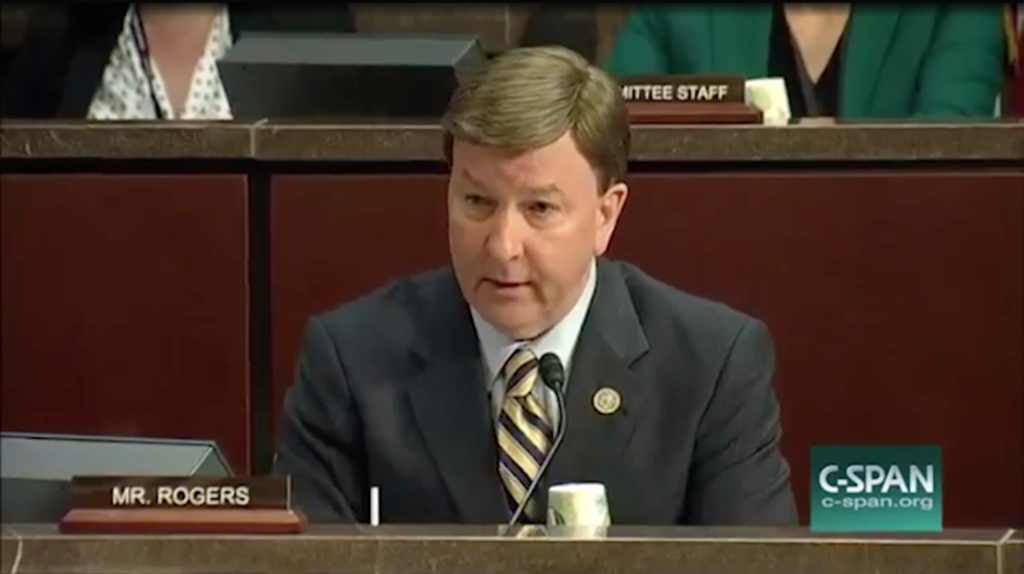
In his role as the Chairman of the powerful House Armed Services Committee, Congressman Mike Rogers led a Congressional Delegation (CODEL) to Romania and Poland to conduct oversight of the U.S. aid being sent to Ukraine. U.S. Reps. John Garamendi (D-California), Donald Norcross (D-New Jersey), Lisa McClain (R-Michigan), Andrew Clyde (R-Georgia), Nicole Malliotakis (R-New York), Mark Alford (R-Missouri), and Chairman Rogers released a statement following their trip. “The American people have every right to know that U.S. military equipment donated to Ukraine is being used for its intended purpose – Ukraine’s fight for national survival,” Rogers et al. said. “As a bipartisan Congressional delegation, we traveled to Poland and Romania to conduct oversight of this process. We came away with a clear understanding of the various safeguards the U.S. government, in partnership with the Ukrainians and other nations, have put in place to ensure each article is accounted for and tracked to the frontline of the war.” “We traveled to the International Donation Collection Center in Poland to see firsthand the accounting and tracking practices which provide accurate counts of shipments into Ukraine,” the congressional members continued. “While there, we also met with General [Antonio] Aguto and the Department of Defense’s Security Assistance Group Ukraine, who provided us with a comprehensive briefing which detailed how the U.S. tracks our donations directly to the frontline. We left that briefing confident in our ability to track U.S. equipment from the moment it leaves our possession and makes it into the hands of Ukrainian warfighters.” “We also relayed the concerns of Americans with the following message: should we confirm that any defense articles are siphoned off, diverted, or missing the flow of U.S. equipment would cease to be tenable,” Rogers and the group continued. “Our job of oversight is not done, and we will continue to monitor U.S. equipment flowing into Ukraine.” There have been some unsubstantiated reports that some of the first-world weaponry the United States and its allies have sent to Ukraine has found its way to international black markets arms dealers. On Sunday, National Security Council spokesman John Kirby said that the U.S. has no timeline for the end of American support to Ukraine. “We don’t know; we would like to see it end now,” Kirby said in an interview on “Fox News Sunday.” “As [President Biden] has said … we’re going to support Ukraine for as long as it takes, and he means that. As long as it takes.” The U.S. has sent $110 million to Ukraine, including 155 mm Paladin self-propelled howitzers, Stryker armored vehicles, Bradley infantry fighting vehicles, HMARS multiple launch rocket systems (MLRS), and even M1 Abrams main battle tanks. Congressman Michael McCaul (R-Texas), who chairs the House Foreign Affairs Committee, called for sending Ukraine F16 fighter jets. “We need to throw/ everything we can into this fight so that they can win, and [Volodymyr] Zelenskyy is going to tell us that soon, as well,” McCaul said. “He had a speech at the conference saying the same thing. And I think the momentum is building for this to happen.” “I hope so,” McCaul said when asked if the U.S. would send Ukraine the fighter jets. President Joe Biden will also travel to Poland to meet with allies on the Ukraine situation. Kirby said that Biden has no plans to personally enter Ukraine. “We obviously are maintaining a high degree of solidarity with the Ukrainian people,” Kirby said. “The United States leads the world in terms of contributions, whether it’s humanitarian assistance or military weapons to Ukraine, and we’re going to continue to use our convening power, to marshall the world, to galvanize support for Ukraine, but there are no plans for the president to enter Ukraine on this trip,” On Sunday U.S, Secretary of State Antony Blinken warned that China is considering supplying weaponry to aid Russia in its war in Ukraine. Mike Rogers is in his eleventh term representing Alabama’s Third Congressional District. To connect with the author of this story or to comment, email brandonmreporter@gmail.com.
Twenty-one attorneys general want Joe Biden to designate Mexican cartels as Foreign Terrorist Organizations
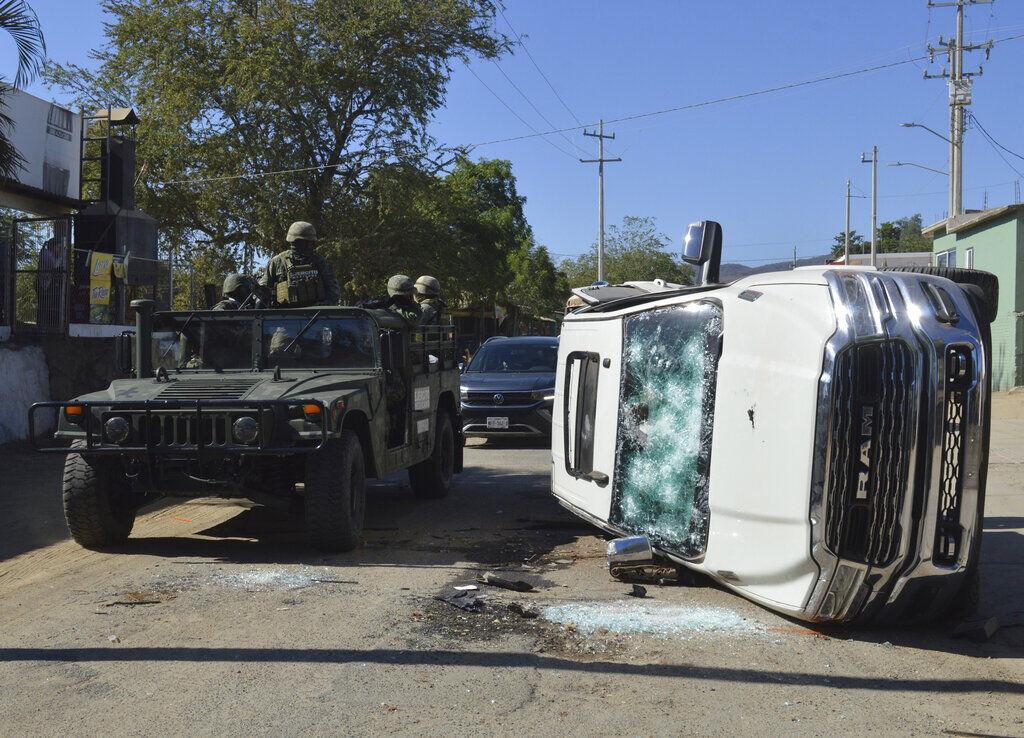
Five months after Texas Gov. Greg Abbott designated two Mexican cartels as Foreign Terrorist Organizations and called on President Joe Biden to do the same, 21 attorneys general also called on the president to do so. The attorneys general sent a letter to the president and Secretary of State Antony Blinken last week after the president’s state of the union address in which he didn’t designate illicit fentanyl as a Weapon of Mass Destruction or designate the cartels as FTOs, requests previously made by attorneys general and Gov. Abbott. Last September, Abbott issued an executive order designating the Sinaloa Cartel, the Jalisco New Generation Cartel, and any similarly situated Mexican drug cartels as foreign terrorist organizations” under Section 219 of the Immigration and Nationality Act. He also requested the president do likewise, the second time he’s made the request since April 2021. In his September 21, 2022 letter, Abbott said since then, “There was no action, no response.” “But if you are ready to make Americans safer,” he wrote the president, “it will be better late than never. As the number of American deaths continues to rise due to the cartels’ terrorist behavior, now is the time to act. We do not have more time to waste.” Still receiving no response, he’s said within one year of Joe Biden’s presidency, fentanyl had killed nearly 20 times more people than those killed in terrorist attacks over decades. Through Abbott’s Operation Lone Star, Texas law enforcement officers have seized over 360 million lethal doses of fentanyl, enough to kill more than everyone in the U.S. Florida law enforcement officers in just a few months last year also seized enough fentanyl to kill everyone in the state. Law enforcement officers in other states are seizing record amounts. While Biden mentioned last week that U.S. Customs and Border Protection agents had seized over 28,000 pounds of fentanyl, he didn’t mention they’ve done so since February 2021 or that in fiscal years 2021 and 2022, they’d seized enough fentanyl to kill nearly 5 billion people. Two milligrams, roughly the weight of a mosquito, is considered a lethal dose. The attorneys general echoed Abbott’s concerns in their letter, pointing to the fentanyl crisis being facilitated by Mexican cartels manufacturing fentanyl and trafficking it, its precursors, and other drugs laced with it through the southern border. They also point to the ruthless violence being committed by Mexican cartels on both sides of the border. Mexican cartels are “assassinating rivals and government officials, ambushing and killing Americans at the border, and engaging in an armed insurgency against the Mexican government,” the AGs write. “This dangerous terrorist activity occurring at our border will not abate unless we escalate our response.” “The Mexican drug cartels threaten our national security beyond the sale of these deadly drugs,” they continue. “Over the past decade, Mexican drug cartels have developed well-organized armed forces to protect their reprehensible trade from rivals and from the Mexican government. The existence of such forces just across our southwestern land border, and the Mexican government’s inability to control them, pose a threat to our national security far greater than a typical drug-trafficking enterprise. That threat is made greater still by the known links between the Mexican drug cartels and [FTOs] like Hezbollah, who already intend to do us harm. Our national security requires the federal government to disrupt this collaboration between cartels and terrorist groups.” Virginia Attorney General Jason Miyares led a coalition of 21 attorneys general representing the states of Alabama, Alaska, Arkansas, Florida, Georgia, Indiana, Iowa, Kentucky, Louisiana, Missouri, Montana, Nebraska, New Hampshire, Ohio, Oklahoma, South Carolina, Tennessee, Texas, Utah, and West Virginia. Miyares last year joined a coalition of 18 AGs led by Florida Attorney General Ashley Moody calling on Biden to designate fentanyl as a WMD, about which he said, “To date, no action has been taken.” In a separate statement, AG Moody said, “It’s evident that the Mexican drug cartels are terrorist organizations,” referring to them “trafficking deadly fentanyl directly across the border … killing tens of thousands of Americans,” and “fueling extreme violence at the southwest border and beyond.” “Sadly, the Biden administration has only emboldened the cartels to commit even more crimes on both sides of the border,” she said, citing a story published by The Center Square about a recent “cartel-style execution [that] occurred in California that reportedly involved a Mexican drug cartel.” She’s also called on the president to hold Mexico and China accountable for their role in creating the fentanyl crisis and has yet to hear back. The AGs argue the cartels’ “recent embrace of extreme violence further justifies their designation as an FTO.” Under 8 US Code, Section 1189, the Secretary of State may designate an organization as an FTO, which gives state and federal agencies the authority to freeze assets, deny entry to cartel members and pursue stricter punishments. Instead, President Biden said his plan to address the fentanyl crisis involved having “more drug detection machines,” implementing greater inspection of cargo to “stop pills and powder [coming in through] the border,” “working with couriers, like FedEx, to inspect more packages for drugs,” and implementing “strong penalties to crack down on fentanyl trafficking.” In response, Texas lawmakers blasted his plan, and Gov. Abbott said, “Once again, President Biden proved Texas leads, and Washington follows.” Republished with the permission of The Center Square.
Mike Rogers: Ukraine war and nuclear threats from Russia show “how valuable NATO cohesion is”

U.S. Representative Mike Rogers, the House Armed Services Committee Chairman, recently participated in a bipartisan briefing with NATO Secretary General Jens Stoltenberg. Following the briefing, Chairman Rogers said that “Stoltenberg assured me of NATO’s continued cooperation” to aid Ukraine in its efforts to thwart a Russian invasion. “NATO is the most successful alliance of modern times,” Rogers said. “The alliance stood together to defeat communism and win the Cold War, and our NATO allies stood with us after the September 11th terrorist attacks. Today, however, the alliance is being tested like never before. [Vladimir] Putin’s war in Ukraine and dangerous threats of nuclear first use against our allies and partners have proven how valuable NATO cohesion is,” Rogers stated. “Secretary General Stoltenberg assured me of NATO’s continued cooperation and support of our robust oversight efforts of aid for Ukraine. I thank the Secretary General for his leadership in supporting Ukraine, bringing Finland and Sweden into NATO, and increasing defense spending across the alliance. The Secretary General also highlighted the need for NATO to adapt to counter the threat posed by the Chinese Communist Party. For too long, Europe tried to engage Russia and became economically dependent on Vladimir Putin for cheap energy. We need to ensure European mistakes with Russia are not repeated with China.” The Chinese balloon that drifted across the United States last week until it was shot down has drawn international attention to China. That balloon was one of several balloons that the Chinese have launched over five continents. The balloons are widely believed to be gathering intelligence for the Chinese military. China has denied that and said that the balloons are civilian weather balloons. “The balloon over the United States confirms a pattern of Chinese behavior where we see that China has invested heavily in new capabilities, including different types of surveillance and intelligence platforms,” Stoltenberg said during a press conference in Washington with U.S. Secretary of State Antony Blinken. “We need to be aware of the constant risk of Chinese intelligence and step up what we do to protect ourselves and react in a prudent and responsible way.” “It is attempting to assert control over the South China Sea and threatening Taiwan, trying to take control of critical infrastructure, including in NATO countries, repressing its own citizens and trampling on human rights and deepening its strategic partnership with Moscow,” Stoltenberg continued. “So NATO allies have real concerns which we discuss today.” In the Russia v. Ukraine war, Putin has called up several hundred thousand reservists and is believed to be about to launch a massive offensive against the Ukrainians. Due to this threat, the U.S. and its NATO allies have pledged western tanks – including the M1A1 Abrams, Leopard 1s and 2s, and Challenger 2s – to aid the Ukrainians. “Ukrainians have proven extremely skilled and capable in operating the equipment, the weapons that NATO allies and partners has provided,” Stoltenberg told CNN. “I am absolutely certain that they will be able to do the same also with the main battle tanks from NATO allied countries, especially because many of them have a lot of experience already from the front lines operating Soviet-era armored vehicles and battle tanks. But, of course, that is a useful background when they start then training on modern NATO battle tanks. We have to remember that this is a war of aggression. President Putin invading another sovereign independent nation in Europe – Ukraine. Ukraine has a right of self-defense, and we have the right to support them in upholding that right; because if President Putin wins, it is challenging for Ukraine and dangerous for us.” Stoltenberg is the Prime Minister of Norway. Rogers was recently elected to his eleventh term representing Alabama’s Third Congressional District. To connect with the author of this story or to comment, email brandonmreporter@gmail.com.
Mike Rogers applauds the shooting down of Chinese balloon

On Saturday, the U.S. Military shot down the Chinese balloon, which many in the government believed to be on an intelligence gathering mission. Congressman Mike Rogers, the Chairman of the powerful House Armed Services Committee, released a statement supportive of the successful mission by the United States military to take down the Chinese balloon. “I applaud our servicemembers for completing a successful mission to neutralize a spy balloon sent by the Chinese Communist Party,” Rogers said. “I remain deeply concerned by the Biden administration’s decision to allow the spy balloon to traverse the United States. The Biden administration reportedly learned of the CCP spy balloon on January 28th – nearly a week before residents in Montana spotted the balloon loitering over their state. It’s clear the Biden administration had hoped to hide this national security failure from Congress and the American people. Now, the White House must provide answers about why they decided to allow a CCP spy balloon to cross the United States and what damage to our national security occurred from this decision. The United States must project strength to deter China – this failure is another example of weakness by the Biden administration.” A U.S. Air Force F-22 shot down the balloon with a single missile on Saturday off of the South Carolina Coast. The Federal Aviation Administration (FAA) had paused flights out of three South Carolina and North Carolina airports to make sure that no civilians were inadvertently put in harm by the mission. The military had considered shooting down the balloon over Montana earlier in the week but elected not to for fear that wreckage could have potentially harmed Americans on the ground. President Joe Biden told reporters, “On Wednesday, when I was briefed on the balloon, I ordered the Pentagon to shoot it down, on Wednesday, as soon as possible. They decided — without doing damage to anyone on — on the ground. They decided that the best time to do that was as it got over water, outside — within our — within the 12-mile limit. They successfully took it down. And I want to compliment our aviators who did it. And we’ll have more to report on this a little later.” U.S. Secretary of State Antony Blinken canceled a scheduled trip to China to protest the intrusion of the balloon over American air space. Blinken’s visit would have been the highest-ranking visit to China by an American official in six years. The Chinese government acknowledged that it was their balloon but claimed it was not an intelligence balloon. They, instead, claim it was a weather balloon that had gone astray and was not on an intelligence-gathering mission. The U.S. Coast Guard is attempting to retrieve as much of the wreckage of the balloon as possible. Of particular interest was a basket of equipment on the underside of the balloon. A second Chinese balloon was confirmed traveling over South America on Friday. Mike Rogers is in his eleventh term representing Alabama’s Third Congressional District. To connect with the author of this story or to comment, email brandonmreporter@gmail.com.
Mike Rogers concerned Russia may have violated START treaty

Congressman Mike Rogers released a letter raising concerns that Russia may be in violation of the new START Treaty. Rogers is the Chairman of the powerful House Armed Services Committee. The letter was made jointly with Rep. Michael McCaul, Chairman of the House Foreign Affairs Committee, and Rep. Mike Turner, the Chairman of the House Permanent Select Committee on Intelligence. The three chairmen addressed the letter to Secretary of State Antony Blinken, Secretary of Defense Lloyd Austin, and Director of National Intelligence Avril Haines. They expressed their concerns that Russia has failed to uphold key tenets of the New START Treaty. “Russia’s unilateral cancellation of the BCC and refusal to restart New START inspections, another key tenet of the treaty, coupled with other statements by its government officials, at a minimum, raise serious compliance concerns regarding the Federation’s adherence to the New START Treaty,” Rogers and the other Republican Chairmen wrote. “This would occur during a uniquely dangerous time when both Russia and China are expanding and modernizing their arsenals, Iran, a state sponsor of terror, continues to expand its nuclear program, and North Korea rattles its nuclear saber.” “We are writing to you today to express our concerns regarding the Russian Federation’s compliance with the New Strategic Arms Reduction Treaty (New START) and the danger its potential non-compliance poses to the future of arms control,” the members wrote. “President Biden gifted Vladimir Putin a clean, five-year extension to New START at the beginning of his administration despite concerns about the treaty, including the weakness of its verification regime and its failure to address Russia’s overwhelming advantage in nonstrategic nuclear weapons. Subsequently ignoring noncompliance, specifically in the context of Russia’s history of violating arms control commitments, would further undermine its own credibility in arms control.” The Congressmen requested that the administration provide a special out-of-cycle determination on compliance by the Russian Federation to the terms of New START that addresses the following: “• Whether Russia’s unilateral cancelation of the BCC, refusal to restart treaty-mandated inspections, or any other issue has resulted in Russian non-compliance or material breach of the Treaty. • Whether Russia has at any point since 2020 exceeded any New START caps and if those violations create a strategic imbalance endangering U.S. national security. • Whether Russia has, over the course of the treaty, used technical compliance as a pretense to violate the spirit of the treaty. • An assessment of the efficacy New START verification regime, to include the BCC and onsite inspections, given Russia’s recent statements and actions.” The START Treaty (Strategic Arms Reduction Treaty) limits the number of weapons of mass destruction that the United States and the Russian Federation can deploy. The new START Treaty limits the United States to just 659 deployed intercontinental ballistic missiles, deployed submarine-launched ballistic missiles, and deployed heavy bombers (the B52, B1, B2, and the new B21). Russia is limited to just 540. Since each launch system is able to launch multiple warheads on their deployed ICBMs, SLBMs, and heavy bombers, START also limits the number of nuclear warheads the superpowers can have. START limits the U.S. to just 1420 warheads, while Russia can have 1549. The treaty also strictly limits the number of missile launchers, ballistic missile submarines, and heavy bombers the two nations can have – both deployed and non-deployed. The U.S. is limited to only 800, while Russia is limited to only 759 total. If the two nations break out of the new START Treaty, that could potentially lead to a renewed arms race. There is already an arms race between the U.S., Russia, and China over who can be the first to develop and deploy hypersonic missiles. Hypersonics travel much faster than ICBMs or SLBMs, much fast than any nation’s known existing anti-missile or surface-to-air missile defense systems can operate at, and do not need to have a nuclear warhead to do devastating damage to a military, industrial, or population center target. On Thursday, the United States reversed its policy and agreed to supply Ukraine with new M1 Abrams tanks for its war with Russia. Ukraine has thanked the U.S. for the main battle tanks and is now asking for F16 fighter bombers. Mike Rogers was made Chairman of the House Armed Services Committee earlier this month. He is in his eleventh term representing the people of Alabama’s Third Congressional District. To connect with the author of this story, or to comment, email brandonmreporter@gmail.com.


